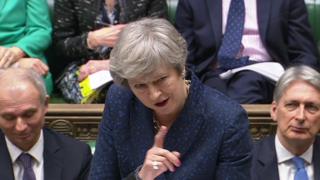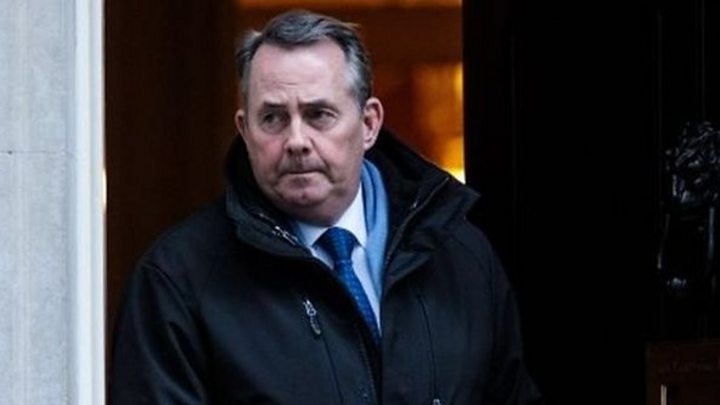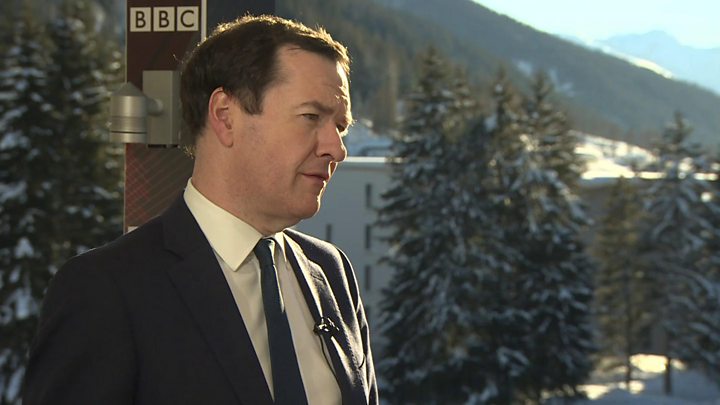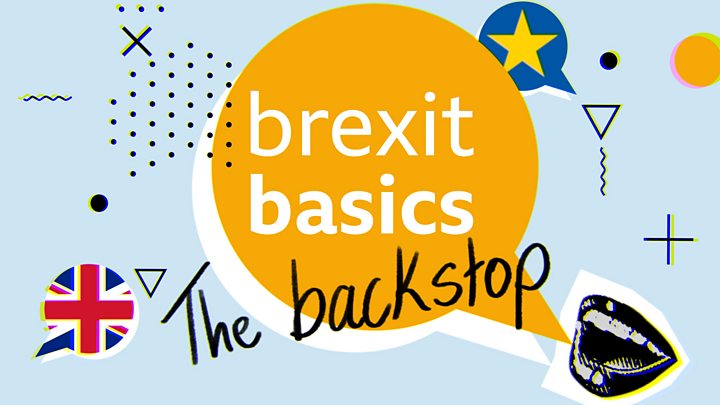 Image copyright
Image copyright
HoC
Theresa May has told MPs attempting to delay Brexit that it would not “solve the situation”.
“The decision remains the same – the deal, no-deal or no Brexit,” she said at Prime Minister’s Questions.
Labour leader Jeremy Corbyn accused her of having a “closed mind” to other Brexit options, such as Labour’s plan for a customs union with the EU.
But the PM attacked him for refusing to meet her and said he did not “have a clue” what his own policy meant.
Meanwhile, leading Tory Brexiteer Jacob Rees-Mogg said “any deal would be better than not leaving at all”.
But he repeated his opposition to Mrs May’s plan, especially the so-called “backstop” – the last resort to stop a hard border being created between Northern Ireland and Ireland after Brexit.
MPs are proposing alternative plans to the PM’s deal with the EU, including seeking an extension to the UK’s exit date – which is currently scheduled to happen at 23:00 GMT on 29 March.
But the prime minister has said the “right way” to rule out no-deal Brexit is to approve her withdrawal agreement.
- Brexit delay is ‘most likely’ – Osborne
- Far-right groups ‘could exploit Brexit’
- Brexit prompts Sony’s Europe HQ move
Under current law, the UK will exit the EU on 29 March, whether or not a deal has been struck. The decision to leave was taken by 52% to 48% in a referendum in June 2016.
Corbyn and May trade barbs over Brexit
Jeremy Corbyn used Prime Minister’s Questions to repeat his call for Mrs May to rule out a no-deal Brexit.
Mrs May attacked the Labour leader for refusing to take part in cross-party talks with her on the way forward.
“The Right Honourable Gentleman has been willing to sit down with Hamas, Hezbollah and the IRA without preconditions, yet he won’t meet me to talk about Brexit,” she told MPs.
Mr Corbyn said: “The door to her office may be open but the minds inside are completely closed.”
He said there could be a majority in the Commons for staying in a customs union, and it was also backed by business and the trade unions and some Tory MPs, so why not get behind it?
Mrs May said a customs union meant that business can export without facing red tape, and her proposed deal would deliver that, while allowing the UK to have its own trade policy.
And she suggested the Labour leader did not know what his policy meant and what the “implications” of it would be for UK trade.
Are Brexiteers warming to the PM’s deal?
Image copyright
Reuters
Mr Rees-Mogg – who is the chairman of the pro-Leave European Research Group – gave a speech in Westminster on Wednesday saying he wanted a deal, but could not vote for Mrs May’s plan while the backstop was in place.
“I do wish, of course, for there to be a deal,” he said. “I always wish to be in the same division lobby as the leader of the Conservative Party. I wish to be a loyal and dutiful supporter of the party I have belonged to for many years.
“[But] this deal does not deliver Brexit. It has more than one problem but overwhelming the biggest problem is the backstop.
“As long as that backstop is there I will not vote for this deal.”
Mr Rees-Mogg said he believed “things were going our way”, with signs from Ireland that there could be room to manoeuvre over the issue.
“Everybody wants a deal; the prime minister wants a deal, the EU wants a deal and the Irish wants a deal,” he said.
“And if the only way to get it is by re-opening the text, that is what they will have to do.”
After leaving Downing Street after a meeting with the government’s chief whip, former Foreign Secretary Boris Johnson said: “There is every chance that if the UK now negotiates with conviction and if we really mean it this time we can secure the changes that we need.”
The prime minister’s supporters say they believe some opponents of Mrs May’s deal are now willing to consider backing it because of the moves by other MPs to delay Brexit.
Are there signs of movement from the EU?
Not on the Irish backstop – chief negotiator Michel Barnier has said the EU would not be willing to put a time limit on it.
But he said the backstop was not the “central issue” and the debate was now about the future shape of the UK’s relationship with the EU, after it leaves with a deal.
“We’re cooperating with the British government. Things could start moving rapidly,” Mr Barnier told The Luxembourg Times.
“We are ready to be more ambitious if the British decide to shift their red lines, for example by remaining in a customs union, or participating in the single market.
“I believe there is a readiness in London for that.”
What is going to happen next?
Next Tuesday MPs will get to vote on Theresa May’s way forward on Brexit, after rejecting her initial plan by a record-breaking 230 votes last Tuesday.
Mrs May is hoping to tweak the deal to address concerns about the Northern Irish “backstop” among her own backbenchers and Northern Ireland’s Democratic Unionist Party, which she relies on to keep her in power.
But MPs are attempting to take control of the Brexit process by tabling amendments to Mrs May’s plans.
What are the main amendments?
Labour MP Yvette Cooper has tabled an amendment that would give time for a bill to suspend the Article 50 process for leaving the EU if a new deal has not been agreed with Brussels by the end of February.
It has been backed by several Remainer Conservatives and is the only amendment that would be legally binding on the government, if passed.
Other amendments would ask the government to consider a range of options over six full days in Parliament before the March deadline or set up a “Citizens’ Assembly” to give the public more say.
Another proposal seeks to win over some opponents of the prime minister’s deal by insisting on “an expiry date to the backstop”, the “insurance policy” intended to avoid a hard border on the island of Ireland.
Tory backbencher Ed Vaizey – who voted for Mrs May’s original deal – said he would back all amendments seeking to stop a no-deal Brexit and called on ministers to follow his lead as the government wasn’t “powerful enough” to sack them for rebelling.
He told BBC Radio 4’s World at One: “Thanks to the hard Brexiteers we’ve been forced into this position where we’re careering towards no deal and Parliament, I’m afraid, has to step in and try and stop that happening.”
Where does Labour stand?
Shadow chancellor John McDonnell told the BBC’s Newsnight that it was “highly likely” the party would back Yvette Cooper’s amendment, which would significantly increase its chances of getting through.
Fox says delay is worse than no deal

International Trade Secretary Liam Fox said delaying or cancelling Brexit would be a “calamitous” breach of trust with the electorate and worse than leaving the EU with no deal.
He said MPs pushing for a delay actually wanted to stop Brexit – and they should think about the “political consequences” of that, not just the “short-term economic consequences”.
“There is no doubt that leaving with a deal and minimising disruption both to the UK and our EU trading partners is in our best interest,” the international development secretary told BBC Radio 4’s Today programme.
“But I think the most calamitous outcome would be for Parliament, having promised to respect the result of the referendum, to turn around and say it wouldn’t.”
But Conservative Remainer Anna Soubry said it was “not true” that Tory MPs backing a move to prevent a “no deal” Brexit – such as Nick Boles, Nicky Morgan and Sir Oliver Letwin – wanted to stop Brexit and had in fact voted for Theresa May’s withdrawal deal.
Mr Boles said Mr Fox had “never been very good at detail”.
Osborne’s ‘Russian roulette’ warning

Former Chancellor George Osborne, a key player in the Remain campaign during the referendum, has said delaying the UK’s exit from the EU was now the “most likely” option.
Speaking to BBC business editor Simon Jack in Davos, Mr Osborne, now a newspaper editor, said that the prospect of no-deal meant “the gun is held to the British economy’s head”.
“Russian roulette is a game which you should never play because there’s a one-in-six chance that the bullet goes into your head,” he said.
Mr Osborne, who was sacked by Mrs May when she became prime minister after the referendum, said his successor Philip Hammond had “sensibly” told businesses that leaving without a deal was not a possibility.
“But we now need to hear it from the British prime minister,” he said.
The other 27 EU member states would need to agree to an extension of the UK’s departure date.
What else is happening on the Brexit front?
Scottish First Minister Nicola Sturgeon, who is meeting Mrs May for talks on Wednesday, said she supports seeking an extension to the Brexit deadline.
Meanwhile, Dyson, the company founded by vocal Brexit advocate Sir James Dyson, has announced it is moving headquarters to Singapore.
However, chief executive Jim Rowan said the decision was prompted by growing opportunities in Asia rather than by Brexit.
What’s the latest on the backstop – and what is it?

The backstop is a position of last resort, designed to maintain an open border on the island of Ireland whatever arrangement the UK and the EU end up with.
At present, goods and services are traded between the two jurisdictions on the island of Ireland with few restrictions because the UK and Ireland are both part of the EU single market and customs union, so products do not need to be inspected for customs and standards.
But, after Brexit, all that could change – the two parts of Ireland could be in different customs and regulatory regimes, which could mean products being checked at the border. Both the UK and the EU worry that having a visible border could put the peace process at risk.
The backstop is opposed by some Conservative MPs and Northern Ireland’s Democratic Unionist Party because it could mean keeping the UK in a customs union with the EU indefinitely and having different rules for different parts of the UK.
But the Taoiseach (Irish prime minister) Leo Varadkar said he could not give up the formal guarantee of the backstop “for a promise that it will be all right on the night”.
The European Commission also warned that it was “obvious” that a no-deal Brexit would mean a hard border in Ireland.
Delaying Brexit won’t solve anything, Theresa May tells MPs


